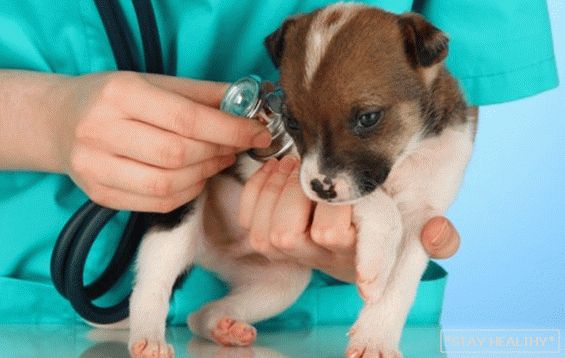 Сб, 24 мар 2018 Автор: Татьяна Качук
Сб, 24 мар 2018 Автор: Татьяна Качук
Rickets amazes young dogs that are still in the process.
growth and development. Due to a poorly balanced diet, the pet does not
enough vital vitamins and minerals. Dogs, like
other living creatures need the correct ratio of calcium,
phosphorus and vitamin D in their diet so that the bones develop properly
in a way. How to prevent rickets in puppies and provide a pet
long and healthy life?
Contents
Rickets in puppies: what is this disease?
Rickets – a disease that prevents proper development
bones, leading to potential frequent fractures and
deformations. Usually occurs in puppies under the age of 6 months. Have
adult dogs are rarely observed. Regardless of the type of rickets,
the reason for its occurrence is always either due to vitamin D deficiency,
either calcium or phosphorus.
– Food rickets is caused by vitamin D deficiency. Vitamin D is
fat soluble vitamin that is needed for normal
formation of bones and teeth, proper absorption of calcium and phosphorus
from the intestines. Vitamin D is also naturally synthesized by cells.
skin in response to sunlight.
– Hypophosphatemic rickets caused by chronically low levels
phosphate in the blood. Bones become painfully soft and fragile.
This is caused by a genetic dominant X-related defect in
the ability of the kidneys to control the amount of phosphate released in
urine
– Renal rickets is caused by a number of kidney diseases. Have питомцев,
suffering from such diseases often decreases the ability
regulate the amount of electrolytes.
Rickets in puppies: causes of the disease
The predominant cause is lack of vitamin D and lack of
adequate amounts of calcium and phosphorus. Other reasons –
congenital disorders that may affect a dog’s ability
produce vitamin D:
– Osteochondrosis.
– Delayed growth.
– Atresia of the biliary tract.
– Hereditary rickets.
Rickets in puppies: risk factors
– Premature birth (low levels of vitamin D, calcium and
phosphorus).
– Limited sun exposure.
– Hereditary metabolic diseases (for example,
X-related hypophosphomic rickets).
– Puppies born to dogs with vitamin D deficiency.
– Kidney diseases that affect calcium absorption and
phosphorus.
– Suboptimal use of calcium, phosphorus and vitamin D.
Rickets in puppies: symptoms of the disease
Young dogs are most often affected by rickets. It may
lead to distortion of the bones, limp, fragility of the bones, leading to
to frequent fractures. Have щенка или молодой собаки могут проявляться
mild signs of lameness, but they quickly turn into something more
serious, and over time, the pet will not even be able to stand up. For what
should pay attention:
– Pain in the bones.
– The limp.
– Swelling around the bones.
– Difficulties in moving.
– Deformation paws.
– Frequent fractures.
– Rubber jaw syndrome.
– Low calcium in the blood.
– Weight loss.
– Spinal, pelvic or skull deformities.
– Uncontrolled muscle spasms.
Rickets in puppies: diagnosis of the disease
Have ветеринара должна быть полная медицинская история щенка. Everything
bones are scanned on X-rays for even
microscopic damage. Other tests that a vet can
recommend may include the following:
– Blood / urine test.
– Bone biopsy.
– MRI.
The first thing a vet will recommend after the examination is
change the dog’s diet so that it includes the correct
соотношение кальция и phosphorus. The prognosis is usually favorable
in the absence of fractures or other irreversible injuries. For dogs
free access to sunlight should be provided
which is an effective way to increase production
vital vitamin D3.
Rickets in puppies: treatment of the disease
The treatment consists in providing high-quality, quality
power supply. If the disease is detected early enough, the puppy will be able to
grow healthy and strong. However, as soon as the disease
progresses to the stage when the puppy is difficult to move,
opportunities for successful treatment are negligible. For achievement
quality effect, the puppy needs to be fed nutritious food,
complex with all the necessary vitamins and minerals. Remember
that overdose is also harmful, as well as lack: if in the diet
too much vitamin D may be increased and dangerous for
life levels of calcium (hypercalcemia) and phosphorus, and if in the diet
in excess only calcium, without phosphorus and vitamin D, puppy condition
may also worsen.
Sources of Vitamin D:
– Oily fish: salmon, mackerel, tuna, halibut, canned
sardines.
– Cod liver.
– Egg yolk.
– Beef, lamb, chicken, pork.
Sources of calcium:
— Рыба: лосось, тунец, sardines.
– Yogurt.
– Low-fat cheese: mozzarella.
– Vegetables: spinach, broccoli, sweet potato (yam).
Sources of phosphorus:
– Seeds: pumpkin, sunflower, chia, sesame.
– Fish: salmon, carp, whitefish, cod, tuna, sardines, mackerel
– Meat: pork, beef and veal
– Low Fat Dairy Products: Yogurt
– Legumes: lentils, chickpeas.
Be sure to consult your doctor before changing your diet.
dogs. A veterinarian will be able to recommend the correct dosage for
вашей dogs. Make tests to look at the level
vitamins and minerals in the body and evaluate whether it goes right
recovery. In severe cases, it may be necessary.
drug therapy with the following drugs: ergocalciferol,
calcium gluconate, trivitamin, various vitamin complexes and
individual vitamins in capsules.
Rickets in puppies: disease prevention
Prevention of rickets is to ensure the proper and
a varied diet consisting of meat, vegetables, cereals,
fermented milk products (kefir, sour cream, cottage cheese), vitamin
complexes suitable for a certain age. Frequent are also important.
walks, consultations at the vet, regular vaccinations and only
positive emotions.






